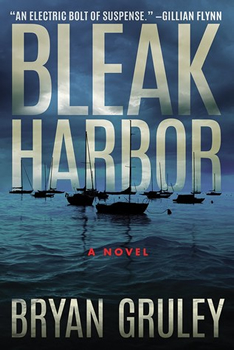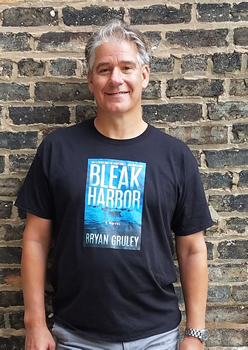

Up Close: Bryan Gruley by April Snellings
How the Lure of a Publisher Ignited a new Direction
With his 2008 debut novel Starvation Lake, Bryan Gruley announced himself as a notable new voice in crime fiction—specifically, the type of evocative, character-driven mysteries that were enjoying a surge in popularity thanks to writers like Dennis Lehane and James Lee Burke.
Starvation Lake, set in an insular, hockey-obsessed town in northern Michigan, was originally conceived as a standalone, but Gruley’s Anthony Award-winning tale of a disgraced journalist who uncovers a murder spawned two sequels—2010’s The Hanging Tree and 2012’s The Skeleton Box—and scored the author a request from his publisher for two additional series entries.
Gruley had an unusual response to the proffered extension: he turned it down.
“When I did that, a lot of my writer friends said, ‘What are you, stupid?’” Gruley says during a phone interview from Bloomberg’s Chicago offices, where he day-jobs as a reporter-at-large. “But the truth was, I just thought I was done with Starvation Lake at that particular point. I had just started a new job here, writing for Businessweek. It’s a great job, so it wasn’t like I needed the money. And I had this other editor saying, ‘Come hither, you’re going to be on the New York Times bestseller list.’”
Gruley found it difficult to resist the overtures of a large publishing house, and he set to work developing new stories. He initially wanted to follow the Starvation Lake trilogy with a serial killer thriller, but that idea received a lukewarm response from the editor who was courting him at the time.
“And then I came up with the idea of a boy who is in trouble, and his parents have secrets,” Gruley says. “If you ask me about my other three books, I can tell you exactly where they came from. But with this one, I think it was more of an evolutionary process. When you take three and a half years to write a book, it’s almost longer than evolution itself.”
The book eventually became BLEAK HARBOR, a twisty, propulsive kidnapping thriller that centers on the disappearance of 15-year-old Danny Peters. There’s no shortage of suspects or possible motives for the abduction; Danny’s mother, whose family founded the town of Bleak Harbor several generations ago, is caught up in a scheme to extort money from her powerful boss, and Danny’s stepfather has made some decidedly bad choices to keep his struggling medical marijuana dispensary from shuttering. As the hunt for Danny grows to encompass an ever-widening cast of shady characters who have scores to settle with his parents, it becomes apparent that the brilliant, autistic, and mostly friendless teen has been swept up in a plot that will leave the town—and his family—forever changed.
Like the Starvation Lake mysteries, BLEAK HARBOR is deeply rooted in its Michigan setting, with the fictional town’s history playing a pivotal role in the drama that unfolds during the search for the missing boy. Gruley, who served as the Wall Street Journal’s Chicago bureau chief before moving to Businessweek in 2011, found the inspiration for BLEAK HARBOR when he visited the Southwest Michigan town of Saugatuck while working on a story for the Journal.
“Saugatuck technically sits on the shore of Lake Michigan, but the town itself is actually on an inland bay, and the bay has a channel that runs out to Lake Michigan,” explains Gruley, a Michigan native who grew up in the blue-collar Detroit suburb of Redford. “When I was there, I was taken by the town and the dunes—the whole western side of Michigan, the western shore, is all dune—as well as by the history of Saugatuck, which was originally a town called Singapore in the 1800s. It was a timber mill, and it thrived for a while feeding timber to Chicago to rebuild after one of its epic fires, and then that ended and the town essentially went away. I don’t remember if this is legend or actual fact, but Singapore was subsumed into the dunes, and I just thought, boy, that’s cool. When I came around to inventing a town for this book, I decided to use at least a geographical analog to Saugatuck, and so BLEAK HARBOR was born.”
While BLEAK HARBOR’s richly developed setting is a Gruley trademark, the novel represents a departure from the more traditional mystery format that defined his earlier novels—a move that was driven by both practical and creative concerns.
“There was that editor at a large house who was whispering in my ear and telling me how Starvation Lake was fine, it’s great work, but you can reach beyond that, you need to get out of your comfort zone,” Gruley says. “I took that quite literally, and it was good advice. And so, new town, new characters, and I decided to write it in third person rather than first. And then eventually—I think I’d written maybe 50 or 100 pages—I decided to go to present tense. I just wanted to try it, and it felt better to me. I liked it.”
That editor didn’t get behind the novel, but BLEAK HARBOR went on to find an enthusiastic home at Thomas & Mercer and score lofty praise from Gillian Flynn, Tess Gerritsen, and Marcus Sakey; and it’s been a mainstay on Amazon’s Mystery, Thriller, and Suspense bestseller list since pre-orders began several weeks ahead of its December 1 release date. And while BLEAK HARBOR is a standalone, readers can look forward to the return of several of the book’s secondary characters in Gruley’s next thriller, tentatively titled Purgatory Bay and due out in January 2020.
“It’s a bay that’s not far from Bleak Harbor, and there’s a young woman who lives there in what’s basically a fortress,” Gruley says. “Her name is Jubilee. She owns the whole lake, and she’s pretty much alone. She suffered a grievous, horrible tragedy in her high school years, and she has set out to reconcile the past with her present. It brings back one of my favorite sub-subjects: it’s set on the weekend of a big national girls’ hockey tournament that’s being hosted at Bleak Harbor. It involves a girl whose mother is connected to Jubilee in a sort of distant way, and at the same time an intimate way.”
- Between the Lines: Rita Mae Brown - March 31, 2023
- Between the Lines: Stephen Graham Jones - January 31, 2023
- Between the Lines: Grady Hendrix - December 30, 2022



